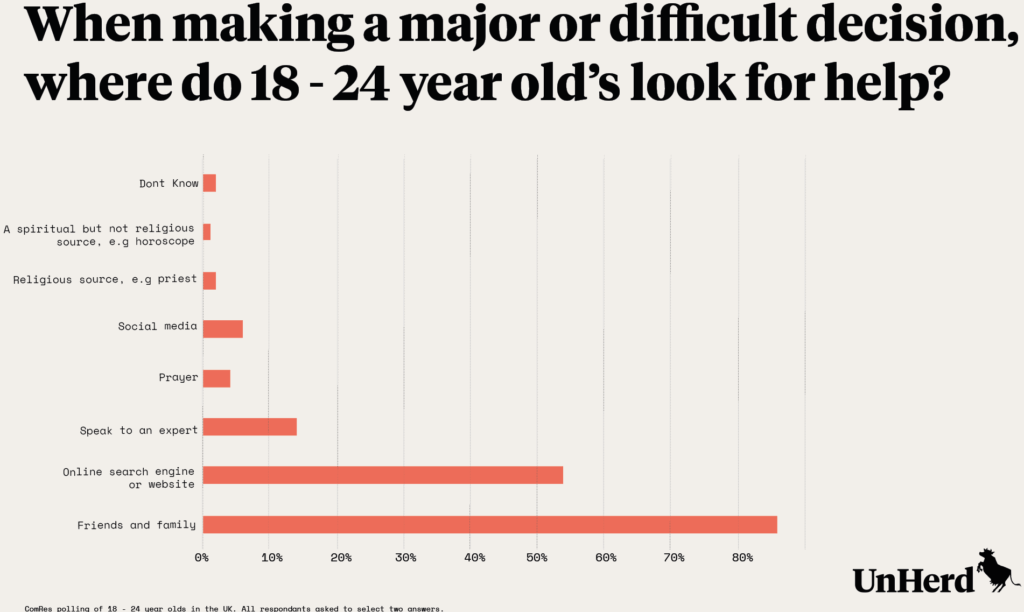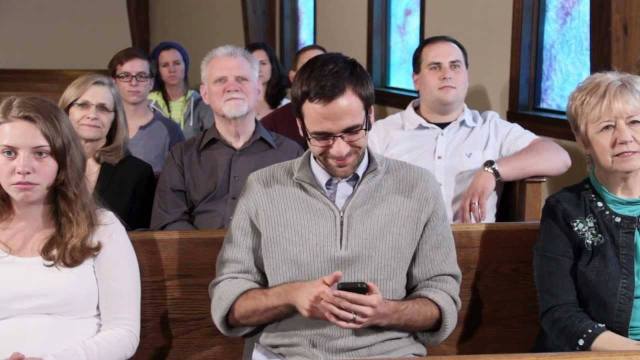Credit: Youtube

The Internet is full of spoofs mocking millennials: their styling, use of language and spontaneous displays of being high on life. So far, so youth culture. But given that childhood is by far the most influential time for faith formation, it’s interesting to ask what the beliefs held by young people today indicate about our religious future.

A recent ComRes poll, commissioned by journalist Ruth Gledhill, of adults in Britain investigating how they make difficult decisions found that people were far more likely to say they would consult with family and friends (77%) than any other source. Prayer and social media returned relatively low responses (6% and 4% respectively). But their order was reversed among respondents aged under 35. Younger adults were twice as likely to say that they would use social media (8%) than to pray (4%) when facing a difficult decision.
It’s tempting to interpret the data to mean that younger generations are replacing religious practice with social media, but that understanding assumes the two activities are in competition. “There is a lot of information on social media in terms of ‘guidance’ which might be more accessible than an imam’, says Coventry University sociologist Dr Serena Hussain, arguing that social media can be a mode of accessing religious teaching. “There are some trusted scholars online who are very mainstream, and that makes it easy to get guidance without having to disclose that you’re having a particular problem.”
Catholic Home Mission Officer Teresa Carvalho confirms the privacy point:
“Online, you can choose what people see and know about you, but if you’re praying, whoever you’re praying to, there’s probably a sense that they know more about you than you’re telling them.”
Social media isn’t a direct replacement for devotions but, for people who’ve been around online technology all of their lives, it’s a new way to do old things – connect with like-minded people, seek guidance – with the added bonus of being able to control what people know about you.
And religious organisations have been quick to harness the power of having an online presence. Apps can now help you read the Bible in a year, find a women-friendly mosque, or date a Jew. Back in 2008, Durham Cathedral would ask people to leave if they were fiddling with their phones during services. Now, their nearby university is a world-leading research centre in digital theology.
But young adults who are pursuing a formal religion – whether online or in their local community – are in the minority. The most recent British Social Attitudes data shows that 71% of 18-24 year olds identify as practicing No Religion, which Humanists UK interpret as a compelling indication of religion’s lack of appeal.
Millennials seem to be far less likely to be nominally religious than previous generations, opting not to tick a box on a survey to affiliate with a religious identity out of habit or heritage in the same way people might previously have identified as Church of England or Church of Scotland. It’s common for ComRes qualitative research participants to say something like: I don’t know what I am really. I was brought up Catholic but don’t really bother with it now. Put me down as None. They appear to be reluctant to identify with a religion out of a sense of duty.
But perhaps this suggests that, these days, people who do identify with a religion often have a reason for doing so. Perhaps this will lead to a smaller but more devout religious population in years to come.










Join the discussion
Join like minded readers that support our journalism by becoming a paid subscriber
To join the discussion in the comments, become a paid subscriber.
Join like minded readers that support our journalism, read unlimited articles and enjoy other subscriber-only benefits.
Subscribe